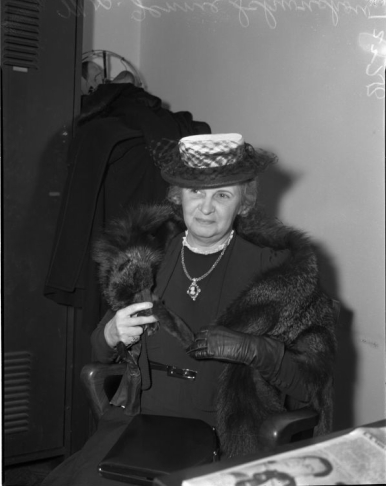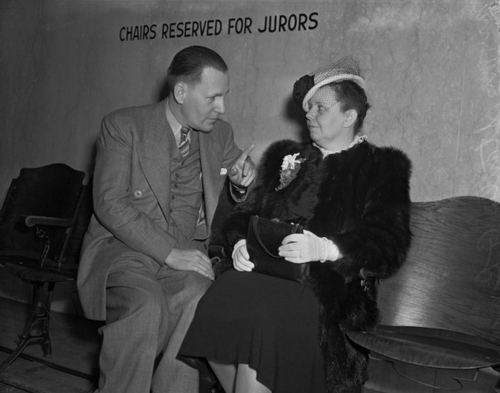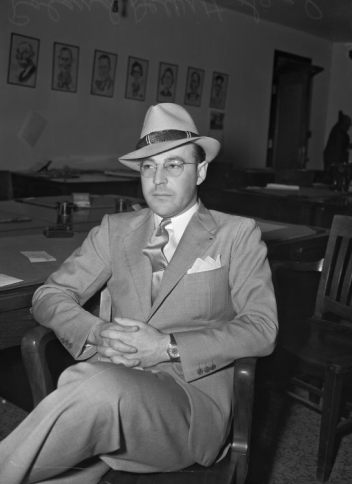Dr. George Dazey’s former in-laws were sure that he had murdered their daughter, Doris Schwuchow Dazey, when he became convinced that the baby boy she had birthed four months prior to her death was not his child. The Schwuchow’s said that he was a rude and uncaring man who never loved the little boy, Walter. Mrs. Schwuchow testified to George’s attitude about the baby:
“The doctor never paid much attention to the child. One time I was visiting my daughter and I saw that the baby was sick and I called Dr. Dazey at the Uplifters Clug and he said the the child had been all right in the morning. I know when a child is sick and I told Dr. Dazey so and he came home and looked at the child and I heard him say, ‘There’s nothing wrong with that damn brat.’ He said it under his breath and thought I didn’t hear him.”
If George was an indifferent and uncaring father, he was an equally unpleasant spouse according to Mr. & Mrs. Stanley Reis.
Stanley Reis testified:
“Four of us were at dinner one night when Dr. Dazey said to Doris, ‘It makes me sick to see you eat; don’t put so damned much in your mouth.”
The prosecution’s case against Dr. Dazey was circumstantial but they had a couple of persuasive witnesses. Frances Hansbury, George’s former employee and occasional dinner companion claimed that he had confessed to her that he’d killed his wife and told her to keep her mouth shut or she’d be sorry. Then there was the rent-a-cop, Roland Seal, who said that on the night of Doris’ death he’d been making his rounds as the operator of a residential patrol service in the Dazey’s Santa Monica neighborhood when he heard screams coming from the Dazey home:
“I heard some screaming coming from the house and on my next round, probably 45 minutes later, I got out of my car and went over n back of the Dazey residence The back door was open and I could see the doctor inside.”
Seal said he then saw Dr. Dazey carrying Doris toward the door of the garage. On cross-examination Jerry Giesler, the defendant’s attorney, managed to get Seal to admit that he’d been in trouble with the law a few times–once for robbery. Seal’s credibility was seriously eroded.
Frances Hansbury didn’t fare much better–Giesler characterized her as a spurned lover with an axe to grind.
Giesler said that the defense was prepared to call forty-six people to testify on George Dazey’s behalf; and the line-up was strong. Among those to testify was Mrs. Kay Roth, the owner of a Santa Monica beauty parlor visited by Doris a couple of days before her death.
Roth said:
“She visited me in the beauty parlor just a few days before she died and told me that she was suffering from a illness from which she would never get well.”
The illness Doris spoke of was Addison’s disease and she’d been diagnosed by George and her father–although the diagnosis hadn’t been confirmed by anyone outside of the immediate family. George had given her the news of her condition but he wouldn’t give her many details nor discuss her prognosis. Undeterred, she looked it up in one of his medical texts and was, according to George, devastated by what she discovered.
It’s possible that Addison’s was the reason why Doris was unable to regain her strength after the birth of Walter; however she may have been suffering from postpartum depression. Known as the “baby blues”, depression following the birth of a child isn’t uncommon–but in some cases it may become extreme. If Doris was suffering from postpartum depression it may have made her suicidal.
Mrs. Roth further testified:
“She asked me about another girl who had tried to commit suicide but when I told her the girl had recovered she said, ‘If I commit suicide I will plan it so there’ll be no slip-ups…”
Kay Roth thought that Doris seemed “mentally depressed and physically exhausted” .
Others who had been in contact with Doris following Walter’s birth described her mental and physical health in much the same way as Kay Roth had done.
When it was Dr. Dazey’s turn to take the stand he testified that he and Doris had been in love and that he had no reason to believe that Walter was not his son.
On cross-examination the prosecution hammered hard on a few points they knew were relevant in proving Dr. Dazey’s guilt. For example it had been suggested that Doris planned to divorce her husband, but George refuted that claim. In fact, George took such exception to the D.A.’s line of questioning the two men nearly came to blows.
By early March 1940 the four week murder trial was finally drawing to a close. Deputy District Attorney Joseph Carr made the closing argument for the prosecution.
“It has been testified here that Mrs. Dazey was a very fastidious person. One would not expect her, then, even if she had determined to take her own life, as the defense contends, to go into the garage and lie down in a pool of oil under the car. She could just as easily accomplished her purpose by sitting in the clean seat of the automobile.
“There is then the fact that she left no notes to anyone. An unusual procedute by one contemplating suicide.”
The prosecutor was also troubled by the fact that rather than staying to render aid to his wife, doctor Dazey ran into the house to phone for an ambulance. As a doctor shouldn’t he have wanted to try to revive her?
“A Boy Scout–not minding a doctor–would have given this woman first aid.”
The D.A. ended his closing argument by requesting that the jury sentence Dr. Dazey to death.
The prosecution may have made the jurors (10 men and 2 women) think–but it was Jerry Giesler who moved them to tears.
“The grandmother of this child–Mrs. Dazey’s mother–wants that child and will stop at no ends to obtain him.”
Adding fuel to his hyperbolic fire, Giesler continued:
“We might expect Hitler to ravish Poland, or a Stalin to rape little Finland on such trumped up testimony from polluted sources, but we do not expect it in American courts of justice.”
Both sides had done their best, it was time for the jury to review the facts in the case and reach a verdict.
Eight hours into their deliberation the jury foreman George D. Hale asked for the testimony of the several of the witnesses. Then he declared that the jury was stuck at eight to four– but wouldn’t disclose whether it was for conviction or acquittal.
The next day, March 9, 1940, the jury sent a note to the judge saying that they were deadlocked at ten to two and they did not believe it was possible for them to reach a verdict. The judge asked them to give it another try–and they did. The next time the foreman reported to the judge he said that the jury was at eleven to one and it appeared a verdict was likely. There was still no hint of whether the lone juror was holding out for acquittal or conviction.
At last the jury announced that they were ready to render a verdict. They filed into the courtroom and George D. Hale read the final verdict:
Dr. Dazey had been acquitted.
One of the prosecution witnesses, a maid named Nancy Bates who had been employed for a short time by the Dazey’s, had testified to the doctor’s dislike for the baby and his contempt for his wife. Damning testimony indeed, until Jerry Giesler produced documentation which proved that the maid had given false evidence. She had lied when she testified that she’d been in the Dazey’s employ immediately prior to Doris’ death. Bates got four months in county lock-up for perjury.
Dr. Dazey won custody of his son Walter. Dr. and Mrs. Schuchow had a new will drawn up which specified that George would never get a dime of their money. A portion of their estate was to be placed in trust for Walter’s benefit.
Three years following the murder trial Dr. Dazey was back in court–but not for murder. His third wife, Dorcas Dazey, had sued him for a divorce alleging extreme cruelty.
In October 1943, less than one year after Dorcas had filed for a divorce, George Dazey’s obituary appeared in the Los Angeles Times. Either Dorcas had withdrawn her divorce suit or it wasn’t completed by the time of George’s death because he was described as her “beloved husband”. Services were held at the Little Chapel of the Dawn in Santa Monica.
This is one of those cases where I’m not sure if I agree with the jury or not. How about you? Do you think justice was denied in this case, or did the jury get it right?




![George Dazey on the witness stand. [Photo courtesy of UCLA digital collection]](https://derangedlacrimes.com/wp-content/uploads/2014/09/george-witness-stand.jpg)
